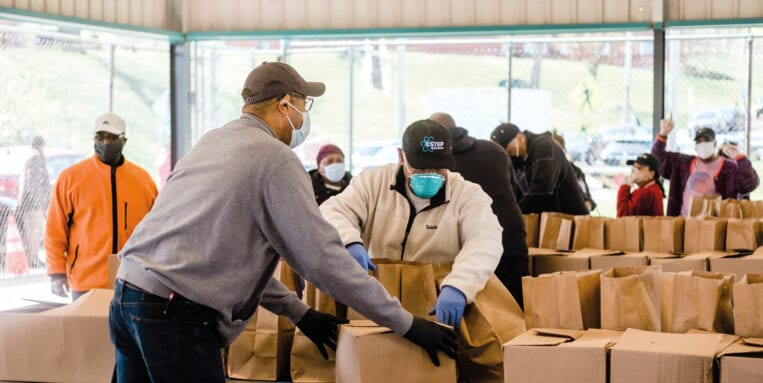Vera House was about a week from its annual White Ribbon Walk when the coronavirus pandemic upended plans for its fundraising and domestic and sexual violence awareness campaign. By March 12 Central New York businesses and schools were shutting down, and Vera House moved its monthlong campaign online to prevent spreading the novel coronavirus. As organizations canceled events and businesses closed, staff worried that people forced to stay home during the global health crisis could face heightened danger of domestic or sexual violence or elder abuse.
“For some people, being together during the best of times is not good,” said Cindy Britz, Vera House development director. “Worries about the coronavirus added to the stressors that are already present and when people have to stay home, they don’t get a break from them.”
Within a week and a half, the agency, which runs with 56 full-time and 34 part-time staff and about 85 volunteers, had set up Zoom accounts and therapists were working from home.
The Syracuse-based agency purchased laptops and webcams and updated their computer server to accommodate the tenfold increase in users. It also made plans for a web chat support line. A grant from the COVID-19 Community Support Fund supported the cost of this technology for remote services.
Vera House can accommodate up to 36 people in two locations. As the crisis continued, it allowed only families or a single person per room, reducing the number of people it could shelter.
Vera House therapists run support groups via Zoom. “Some people take their computer or phone to the garage for privacy,” Britz said. Participants in the Trauma-Informed Parenting Group say the service has been a lifeline and helped them feel more equipped to help themselves and their children.
Anticipating a spike in the need for services — state officials reported 15 to 20% increases in domestic violence calls in March and April — staff reached out to clients who had ended service in the last six months to see if they needed additional support. Vera House trained its staff to help with direct service and continue to answer its 24-hour support line in the office.
“The calls we’re getting are about more complex situations,” Britz said. “We anticipate as things open up and people can have more space, more people will reach out because they can.”
The crisis forced the agency to quickly step up its virtual capability, a goal that had been part of its strategic plan. “Some people cannot get to a group because of the time to travel,” Britz said. And sometimes office visits are not the best fit for a client.
“This situation is providing an opportunity to reach more people and groups than we could before,” she said. “When we can work in person again, we’re going to continue to offer some services virtually. We want to meet people where they’re at and give them what they need.”
Chadwick Residence, a supportive housing program in Syracuse that serves homeless women and their children, has also added remote services. “We’re doing our best to provide effective services,” said Jenni Gratien, executive director.
But the program’s immediate need was cleaning supplies. Chadwick Residence houses up to 17 women and 10 children. The agency implemented social distancing practices, but shared spaces put people at risk, especially women with underlying health conditions.
A COVID-19 Community Support Fund grant helped Chadwick Residence purchase cleaning supplies and personal protective equipment to protect the health and safety of their clients and staff.
Chadwick Residence closed lounges and the computer room. But community living – which includes sharing bathrooms – is challenging while trying to social distance.
“The idea of being able to quarantine in an area no one else uses was impossible,” Gratien said. “The women who come to our program are dealing with a lot. They may have high anxiety, especially when it comes to cleaning. Others may not have the same skill set when it comes to cleanliness.”
Stay-at-home orders also increased residents’ stress. “They lack transportation, and they have fewer family and professional supports,” Gratien said.
Chadwick Residence has maintained 24-hour staffing. Everyone wears a mask, and residents are encouraged to maintain cleanliness and respect others’ space.
Three months into the crisis, supplies are easier to get, but costs are going up. “We were planning for a month,” Gratien said. “Our cleaning has increased exponentially. We realize this is going to be a longer road.”









